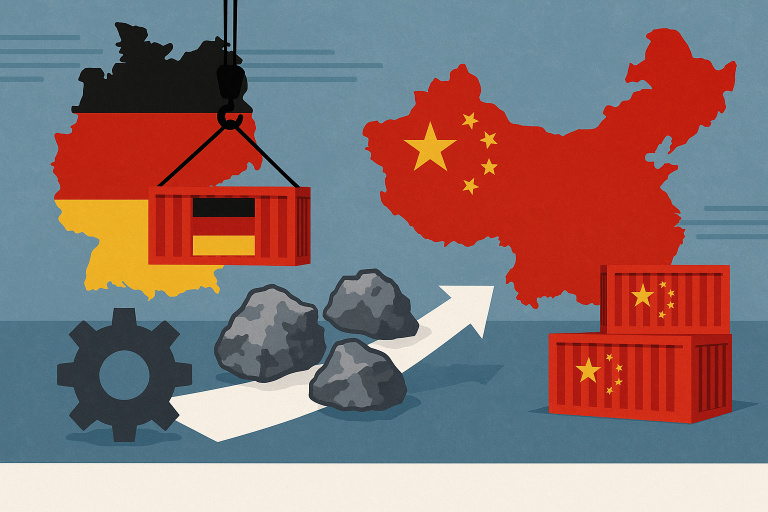Germany has launched a renewed push to stabilise trade relations with China as Finance Minister Lars Klingbeil arrives in Beijing.
His visit comes at a critical point for Europe’s largest economy, which is grappling with escalating export restrictions from China, especially on rare earth elements essential to its manufacturing base.
With industrial supply chains under strain and trade gaps widening, Berlin’s urgency to recalibrate its China policy is now in motion.
Klingbeil’s mission reflects Germany’s broader goal of asserting control over its trade future while avoiding deeper economic disruptions.
Berlin seeks new footing amid rare earth controls
Klingbeil’s visit to China marks a strategic move as Germany attempts to counter mounting pressure from Beijing’s export policies.
He is the first member of the new conservative-led government to make the trip, accompanied by Bundesbank President Joachim Nagel and senior representatives from the banking and insurance sectors.
The minister’s primary stop is the German-Chinese financial dialogue in Beijing, a format created in 2015 to support bilateral economic coordination.
The latest talks come as Germany seeks to challenge Chinese overcapacity in critical sectors, including steel and electric mobility, while securing stable access to raw materials such as rare earth elements.
Before his departure, Klingbeil stated in Berlin that such access is vital to protecting German jobs and economic output.
China’s tightening grip on rare earth exports has sparked concern across Europe. These elements are crucial for manufacturing everything from automotive parts to electronic devices.
The risks became clearer following Beijing’s recent export control measures, which impacted German production lines and exposed the fragility of current supply dependencies.
Policy coordination takes shape at EU level
To support a cohesive response, Klingbeil coordinated policy positions with EU trade officials before travelling to China.
As Germany operates within the European Union’s trade framework, alignment is essential for strengthening the bloc’s collective leverage in negotiations with Beijing.
The European Commission has also voiced concern over the growing influence China holds through its dominance in rare earths and critical materials.
Germany’s latest diplomatic engagement signals a more assertive approach as it pushes for systemic reform in how the EU interacts with China on trade and industrial security.
The urgency has grown as trade disputes spread. One recent example involved the Netherlands and Chinese-linked chipmaker Nexperia, adding to unease about China’s expanding control over supply chains tied to European technology sectors.
Domestic pressures push for structural shift
The trip also addresses internal political demands. Lawmakers in Germany are calling for a full review of the country’s trade reliance on China.
Some critics have blamed earlier Social Democrat-led governments for fostering excessive dependence on Chinese imports and markets, leaving Germany vulnerable to external shocks.
On Thursday, the German parliament appointed an expert commission to re-evaluate trade policy towards Beijing.
Maximilian Butek, executive director at the German Chamber of Commerce in East China, said Chinese measures had caused near shutdowns in certain production sectors.
These disruptions have increased pressure on Berlin to secure diversified sources of raw materials and avoid future bottlenecks.
Jacob Gunter, head of economy and industry at Merics, noted that only substantial disruptions may compel leaders to make necessary policy decisions.
Klingbeil looks to Asia beyond Beijing
After his meetings in Beijing, Klingbeil is expected to travel to Shanghai to engage with German mid-sized businesses operating in the region.
These firms have been significantly affected by material shortages and trade unpredictability.
His final stop will be Singapore, where further talks are scheduled as part of Germany’s effort to broaden its economic partnerships across Asia.
This reset in approach comes as German exports continue to face external pressures, partly linked to global trade shifts sparked during the Trump-era tariffs and continued by geopolitical realignments.
The focus now turns to whether Berlin can convert this diplomatic outreach into a lasting trade balance and security.
The post Germany steps up China trade reset as rare earth curbs tighten grip appeared first on Invezz

